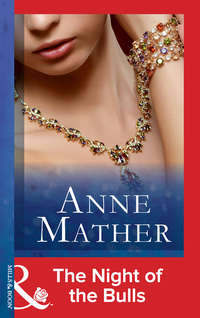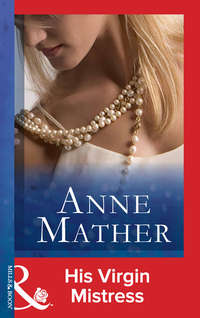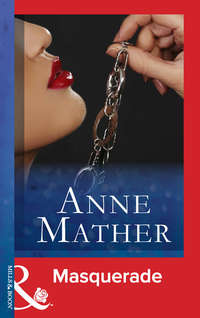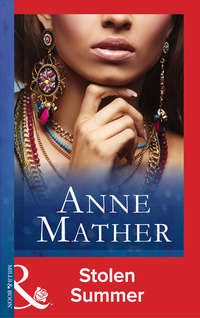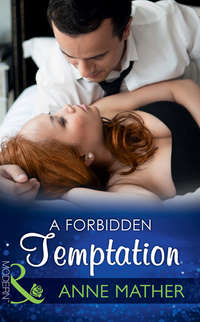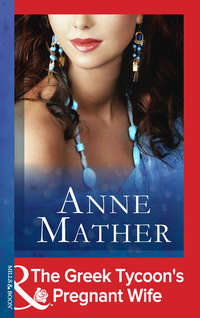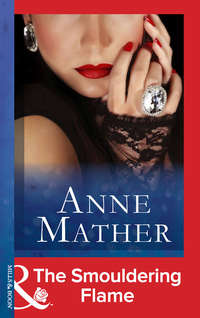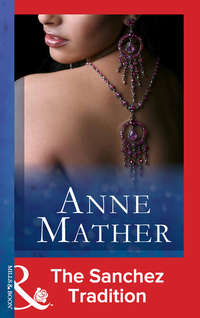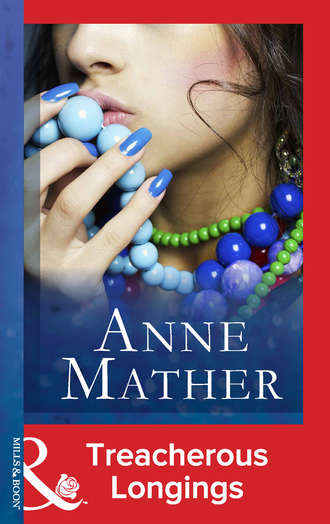
Полная версия
Treacherous Longings
‘And what have you been doing this morning?’ Quinn asked after they were seated, refusing to be daunted by her sulky face. He could guess, of course. She’d probably been shopping. A lazy saunter through Harrods, and coffee with one of her girlfriends.
Susan shrugged. ‘Not a lot.’
‘Shopping?’
‘I don’t just go shopping,’ she flared, and Quinn’s lips twitched at the transparency of her defence.
‘OK,’ he said softly. ‘So what have you been doing? Of course. I’d forgotten. It’s Tuesday. You visit the health club on Tuesdays. No wonder your cheeks are so pink.’
‘If my cheeks are pink, it’s because I’m cross with you,’ retorted Susan shortly. ‘You’re always saying I show no interest in your work, and now, just because I have, you’re acting as if I was asking you to divulge state secrets or something.’
‘Suse—’
‘Who cares about Julia Harvey anyway?’
‘Hector’s hoping everybody will,’ put in Quinn drily.
‘Well, I don’t.’ Susan sniffed. ‘She’s just another old film actress, as far as I’m concerned. I doubt if they’re exactly thin on the ground.’
‘She was quite unique,’ murmured Quinn reluctantly, aware that he wasn’t doing himself any favours by defending her, and Susan gave him a scathing look.
‘Is that your opinion? I thought you were too young to notice.’
Quinn sighed. ‘Don’t be bitchy, Suse. It doesn’t suit you.’
‘Well...’ Susan shook her head. ‘I don’t see anything clever in acting in movies. I’ve heard they only film about a minute at a time. They don’t even have to remember lines. Daddy says it’s money for jam.’
And he would know, thought Quinn with uncharacteristic malevolence. He was not often in tune with the views of Maxwell Aitken, one of the most influential businessmen in the country. He was the head of Corporate Foods, with a chain of successful supermarkets behind him. If anyone knew anything about jam, he did, but that didn’t make him an expert on making films.
But, ‘Really?’ Quinn responded now, in no mood to pursue this discussion. ‘Well, he’s probably right,’ he added. ‘And I’m sorry if you think I was rude.’
Susan was easily mollified. ‘Well, you weren’t rude. Not really,’ she said, stretching her hand across the table and capturing his fingers. She smiled. ‘You just seem sort of—grumpy, that’s all. Is it because you don’t want to go and see this woman? Is Pickard putting the pressure on because he knows your mother knew her?’
Quinn stifled a groan. ‘Something like that,’ he agreed pleasantly. ‘Now, can we talk about something else? I’ve only got about half an hour. We’re taping the last segment of that prison documentary this afternoon.’
Susan pulled a face. ‘At Wormwood Scrubs?’ she asked, shivering delicately, and Quinn pulled a wry face.
‘No. In the studio,’ he corrected her drily. ‘We’ve got Patrick George coming in to conduct a discussion between members of the public and the society that protects the rights of prisoners. It should be interesting. He’s quite right-wing, I believe.’
Susan grimaced. ‘I don’t know how you can bear to be involved in that kind of debate!’ she exclaimed. ‘I positively cringed last week when you said you’d visited that prison. I’m sure your mother and father would rather you were involved in estate matters. I mean, who’s going to look after Courtlands when your father decides to retire?’
Quinn eased his legs beneath the narrow table. ‘Believe it or not, but that doesn’t keep me awake nights,’ he drawled, his eyes, which in the subdued light looked more black than grey, glinting mockingly. ‘If you want to be lady of the manor, Suse, I think you’d better set your sights on Matthew. I fear you’re going to be disappointed if you think I’ll ever change.’
Susan pursed her lips. ‘But you’re the eldest son!’ She shook her head. ‘It’s expected of you.’
‘Blessed is the man who expects nothing, for he shall never be disappointed,’ remarked Quinn drily, and Susan sighed.
‘Who said that?’
‘I think I just did.’
Susan gave him a reproving stare. ‘You know what I mean.’
‘Oh—Pope, I think. Yes, it was. Alexander Pope: 1688-1744, poet and scholar.’
Susan looked as if she would have liked to make some cutting comment in response, but the arrival of their sandwiches prevented any unladylike burst of venom. Instead she contented herself with saying, ‘You’re so clever, aren’t you? I really don’t know what you see in a scatterbrain like me.’
‘Don’t you?’
Across the table, Quinn’s eyes glowed with a most unholy light, and Susan chuckled happily as she bit into her sandwich. ‘Well, maybe,’ she conceded, tucking a shred of beef into the corner of her mouth and blushing quite disarmingly. ‘Oh, Quinn, stop looking at me like that. You’re supposed to be eating your lunch.’
CHAPTER TWO
ELIZABETH screamed, and Harold shot almost two feet into the air. Heroines weren’t supposed to do that, thought Harold crossly, but even he had been startled by the sudden appearance of the dragon. It was all very well telling himself that the dragon was friendly, but that didn’t mean he had to like it. It was so big and white and scaly. How could he persuade Elizabeth there was nothing to be afraid of, when he was shaking in his paws? She was only a girl, after all...
So much for female emancipation, thought Julia wryly, placing both hands in the small of her back and arching her aching spine. But then Harold was the hero of the story. And the audience she was aiming at didn’t mind a little chauvinism.
It was a new departure for her all the same, and one she wasn’t entirely convinced by yet. The trouble was, since that grotty little man had appeared on her doorstep, she was finding it difficult to concentrate on anything, and having a male character as the main protagonist required a different kind of approach.
Still, Jake liked it, she consoled herself, determined to put the memory of that disturbing incident out of her mind. And it was because of him that she was trying something new. Her agent would have had her writing Penny Parrish books until her teenage fans were tired of them, but with twenty under her belt Julia was ready for a change.
The temperature didn’t help, of course. At present the thermometer was reading well into the eighties, and although she’d only been at the word processor for a little over an hour her spine felt damp and her shorts were sticking to her.
Perhaps she should have chosen to write about a fire dragon, she thought, studying the last few lines she’d written with a critical eye. But a snow dragon was much more original, and Xanadu, as she’d called him, was turning out to be such an appealing character. Even if he did make Elizabeth scream, she appended with a rueful smile.
She sighed and glanced at the slim gold watch on her wrist. Eleven o’clock, she saw with some relief. Time for a nice cup of coffee. Harold could consider his options for another half-hour. After all, Old English sheepdogs weren’t noted for their agility.
Getting up from her chair, she walked rather stiffly through the living-room and into the spacious kitchen she’d designed herself. Hardly space-age, it nevertheless combined the homeliness of a farmhouse kitchen with some of the technology of the nineties, and although she didn’t have a dishwasher she had all the gadgets necessary to prepare and cook good food.
Food was something she had become rather an expert on. She had discovered, somewhat belatedly, that she had a natural talent for baking and, growing most of her own produce as she did, she enjoyed experimenting with her craft.
Besides, in the early days, before she had found she could make her living at writing children’s books, she had had lots of empty hours to fill. Looking after one small boy did not absorb all the energies she had expended as a busy actress, and she had found the transformation from public figure to private individual rather disconcerting at first.
Not that she had ever regretted it. Long before she had made the decision to give it all up she had been feeling increasingly dissatisfied with her life. In spite of her success, and the many friends she had made because of it, she had grown tired of the adulation. It had all been so superficial, and she had been desperate to escape.
She supposed her mother’s death had had something to do with it. Without Mrs Harvey’s encouragement, Julia doubted she’d ever have attended drama school, let alone had a successful career. Unlikely as it might have seemed to other people, she had wanted to go to university, and then get married. She hadn’t wanted to be an actress. Becoming rich and famous hadn’t interested her at all.
Well, not to begin with, she conceded honestly, remembering that she had had a lot of fun in those early days. The press calls, the parties, meeting famous people—it had all seemed quite wonderful to the innocent Julia Harvey. She had been the darling of the photographers; she couldn’t seem to put a foot wrong.
Until Hollywood had called, and the rumours about her personal life had started to circulate. It hadn’t mattered that the stories were false, that her mother had made sure she didn’t do anything to ruin her image—they’d printed them just the same. It was as if her success had generated a kind of resentment in the reporters who had previously lauded her. Unwittingly she had gained a reputation that grew more outrageous with every film she made.
But by then she had been able to handle it. It was amazing how quickly she’d learned to parry insults with the same ease as she’d accepted compliments. The fallacy that she had had affairs with all her leading men had been good publicity, after all. The studios hadn’t denied it. It had incited interest in her films.
She supposed they had all been waiting for the moment when she took her clothes off. They had wanted to see her naked so that they could justify what they’d written. But in fact Julia had never done a nude scene. That was one discrimination she had insisted on in every contract she’d signed.
Her mother’s death had robbed her of much of her motivation, however. Without Mrs Harvey’s influence, she could be more objective about her life. She no longer had to accept roles because it was what her mother expected of her. She didn’t have anything to prove any more. In essence, she was free.
Not that Mrs Harvey had been the reason for her decision to leave acting, Julia acknowledged wryly as she spooned beans into the coffee-grinder. Without other forces to make those needs paramount, she might never have found the strength to walk away. She’d grown used to her image. Wealth, admiration—power—were addictive, after all. And she had been as guilty as anyone of using them to her own ends.
With the beans ground and transferred to the percolator, Julia stepped through the open doorway on to a vine-shaded veranda. Cane furniture, liberally strewn with cushions, was protected by a leafy screen of bougainvillaea, and beneath her feet the bleached boards were comfortably warm and brittle.
She stared unseeingly at the view that had initially sold the villa to her, aware that her current preoccupation with the past had been brought about by the appearance of that reporter. No matter how she tried, she couldn’t shake the conviction that she hadn’t seen the last of him. For God’s sake, he hadn’t recognised her! Why couldn’t she leave it at that?
She sighed, allowing her eyes to focus on the surf that creamed on the reef a couple of hundred yards out from the shore. It was so beautiful, she thought, as she had thought so many times since she and Jake had moved in. Unspoilt and peaceful. Exactly as it had always been. Nothing had changed.
She rested her hands on the hip-high rail that circled the veranda, and noticed that the paint was peeling again. She’d only painted it a few months ago, but the sun was an unforgiving master.
Still, the villa was much different now from the way it had been when she had first seen it. Without the view, she might have paid more attention to its scratched and peeling timbers, to a roof that had been leaking for years, and the uninvited tenants who had moved in. Not human tenants, she had discovered, but a whole menagerie of furry creatures, large and small, living off the woodwork and nesting in the roof. The whole place had needed gutting and restoring, but Julia had tackled it gladly. So long as she was going to be able to wake up every morning to that stunning vista of milk-white sand and blue-green water, she’d been prepared to do what was needed.
And she had. Ten years on, Julia owned to a certain possessive pride in her house and garden. It was hers. She had created it. Some divine power might have created its surroundings, but she had turned the house into a home.
And now it was being threatened, she thought tensely, her thoughts irresistibly returning to the man who had invaded her tranquillity. How had he found her? That was what she would like to know. Benny had kept his promise. He’d revealed her whereabouts to nobody.
Once she had been afraid. Once she had lived each day dreading recognition and discovery. She hadn’t believed she could escape her old life so easily. Someone was bound to find her. Somewhere she’d made a mistake.
But the years had gone by, and now Benny was dead, too. She’d been sure the world had long forgotten her. Well, forgotten Julia Harvey, at least, she reflected ruefully. Julia Harvey was long gone. She was Julia Stewart now: amateur artist and professional writer. Why couldn’t they leave her alone? Why couldn’t they let it rest?
But something told her they wouldn’t. Even if she had convinced that man—what was his name? Neville something or other—that she didn’t know where Julia Harvey was, she felt sure he’d be back. He was only a minion, after all. He’d said he’d come from London, that he’d been given her address as San Jacinto. What if they sent someone else, who remembered her? Not a brash young reporter who’d still been wet behind the ears when she was young.
All the same, she had changed—quite a lot, she consoled herself firmly. Once she had thought nothing of spending a thousand dollars on a beauty treatment, but these days her hair was unstyled and bleached by the same sun that had aged her veranda. The skin that a generation had raved about was tanned a tawny brown and, although she was still slim, her hips were broader, her breasts much fuller since she’d had Jake.
She looked what she was, she decided grimly. A thirty-seven-year-old single mother, with no pretensions to glamour. Whatever that reporter had hoped to find, she hadn’t fulfilled his expectations. He’d been quite prepared to believe that she couldn’t possibly be his quarry.
Sweat was trickling down between her breasts now, and, lifting her arms, she swept the weight of her hair from the back of her neck. Although she wore it in a braid most days, today she had left it loose, and she tilted her head to allow the comparative freshness of the breeze to cool her moist skin. Perhaps she ought to consider having air-conditioning installed, she reflected, but she’d miss the freedom of leaving all the doors and windows open. Still, if the media was going to start beating a path to her door again, she might be forced to lock herself in.
If she stayed...
The percolator had switched itself off behind her and, refusing to worry about the matter any more, she went back inside. The terracotta tiles felt almost cold after the heat outside, and the air was fragrant with the trailing plants and pots of herbs she cultivated on her windowsills.
Looking at the herbs reminded her that she would have to go over to George Town before the end of the week. Although San Jacinto had its own thriving little market beside the harbour, most manufactured goods had to be brought from Grand Cayman, which was a three-hour ferry ride away. Julia owned a small dinghy, which she and Jake sailed at weekends, but it wasn’t suitable for carrying supplies. Generally she and Maria, the island woman who shared the housework with her, visited the capital of the Cayman Islands every couple of weeks. It was a pleasant outing, shopping for stores and having lunch in one of the many excellent restaurants.
George Town was where Jake attended school, too. He boarded there throughout the week with the headmaster and his wife, coming home at weekends, from Friday through to Sunday.
He hadn’t liked it at first. During his early years Julia had tutored him herself, and Jake hadn’t been able to see why she couldn’t go on doing so. But it was for another reason that Julia had insisted on his attending St Augustine’s. Although her son had friends on San Jacinto, she knew he needed the regular company of children his own age. Besides, her life was so solitary. It wasn’t fair to let him think that he didn’t need anyone else.
Carrying her mug of coffee with her, Julia trudged back to her office and resumed her seat at the word processor. A couple of weeks ago, Harold’s adventures had filled her with enthusiasm, but now it was difficult to keep her mind on her work. Anxiety, apprehension, fear; call it what she would, she was uneasy. A horrible sense of foreboding had gripped her, and she couldn’t quite set herself free.
* * *
By the end of the following week, Julia was feeling much better. Time—and the fact that she was sleeping again—had persuaded her that she had been far too alarmist about her visitor. So what if the man had come here? So what if he’d asked questions about her? She’d given him his answer. There was no reason for him to come back. After all, she was the only Englishwoman of her age living on the island, and he might think a mistake had been made. It was unusual, perhaps, to find a woman living alone out here. And people were always intrigued by non-conformity. Maybe that was how conclusions had been drawn. Conclusions which she hoped she had persuaded her visitor were incorrect.
But such thoughts were still depressing, and she avoided them. Only occasionally now did she wonder why anyone should have chosen to look on this island. Where had they got their information? Who still knew where she was?
It was late afternoon when she finally turned off the word processor. Normally she would have worked on until suppertime, but it was Friday and she had to meet Jake from the ferry. Fridays were always special, with her son’s return and the prospect of the weekend ahead to look forward to. She seldom worked when he was around. They enjoyed spending time together.
Earlier in the day, she had prepared Jake’s favourite meal of pizza followed by sticky toffee pudding and ice-cream, and all she had to do when they came home was put them in the oven. Not the ice-cream, of course, she thought humorously as she set the kitchen table for two. Anything cold had to be kept in the freezer, or else it dissolved into an unappetising soup.
It was getting dark when she left the villa, but she knew the route to the small town of San Jacinto blindfold. She had driven this way countless times before, though it never failed to charm her.
Her villa was at the south-western end of the island, approximately five miles from the town. The road wound its way inland for a distance, twisting among palms and flowering shrubs before seeking the coastal track again, where shallow cliffs and rocky outcrops made fantastic shapes in the fading light. It was a narrow road, sprouting weeds in places, and always at the mercy of the crowding vegetation. Unlike other islands, there was no shortage of water on San Jacinto, and plants and shrubs grew lushly in its rich, verdant soil. Julia was always fascinated by the orchids. She’d never seen them growing wild before.
She passed no one on the road, though she did pass several other dwellings. The island doctor, Henry Lefevre, and his wife, Elena, lived next door, and further along the coast she skirted the Jacob plantation. Bernard Jacob grew sugar-cane and sweet potatoes, producing his own very potent spirit that he exported to the United States.
The tiny village of West Bay, where Maria lived, was on the way, too. When Jake was home he spent a lot of his time in West Bay, playing with Maria’s two sons and three daughters. Julia had always been thankful that he had Maria’s children to play with, though the fact that he was an only child occasionally caused some friction.
Jake could never understand why, if she had had one child without a husband, she couldn’t have two. She knew he would have loved a brother or sister of his own. But Julia had no intention of making that mistake again.
San Jacinto was roughly horseshoe-shaped, with the port of San Jacinto situated on the inner curve of the stretch of water known simply as the Sound. To reach the town, Julia had to cross the island at its narrowest point and then negotiate the descent from towering cliffs, which were the highest point on the island.
The town was busy. The return of the ferry, which only ran three times a week, was always a source of some excitement to its inhabitants. San Jacinto got few visitors, but the islanders were sociable people and there was always the anticipation of meeting someone new.
Julia, however, avoided newcomers whenever possible. Fortunately, those tourists who did come were obliged to stay at one of the two boarding establishments near the harbour, and although they could hire Mokes for touring the island her property was sufficiently remote to deter trespassers.
The ferry was in sight across the bay, and Julia parked her open-topped four-by-four beside the sea-wall and sat for several minutes just enjoying the view. With the sun sinking steadily behind the cliffs, the sky was a brilliant palette of colour. She could see every hint of red, shading through to magenta, with a lemony tinge to the clouds that heralded the night. They had a short twilight on the island, though not as short as it was nearer the equator. Here it was a much more civilised transformation, with a velvety breeze to offset the heat and cool her perspiring skin.
‘You expecting company, Mrs Stewart?’
Ezekiel Hope, who ran one of the island’s two hotels, had come to prop himself against the bonnet of the Mitsubishi, and Julia gave up her contemplation of the view to get out of the vehicle and join him. She had stayed at the Old Rum House herself, while the villa was being dealt with, spending the latter half of her pregnancy on his veranda, sunning herself in one of his rattan chairs.
‘Just my son,’ she said now easily, drawing a navy sweater about her shoulders. She glanced towards the quay, where the ferry was steadily negotiating its docking. ‘Are you expecting visitors too? I suppose it is the season.’
‘Just one visitor,’ replied Ezekiel carelessly, flexing his gleaming biceps beneath the thin cotton of his vest. Zeke, as he was commonly known, was proud of his muscular torso. Although he was in his sixties, he assured everyone that he could still hold his own with the most obstreperous of his customers.
Julia refused to be alarmed by his answer. Nor had she any intention of asking who his visitor might be. She had heard that that man—Neville? Yes, Neville Hager, that had been his name—had stayed at the Old Rum House too when he was here. And she had no wish to draw attention to the fact or arouse Zeke’s curiosity.
‘You had another visitor yourself, couple weeks ago, didn’t you, Mrs Stewart?’ Zeke remarked after a moment, thereby restoring all of Julia’s fears. ‘Said he was looking for a Ms Harvey, isn’t that right?’ He shrugged. ‘I told him we didn’t have no Ms Harvey on the island, but he seemed to think you might be able to help him.’
‘But I couldn’t,’ said Julia shortly, and Zeke gave her an apologetic look.
‘I know that. And I hope you didn’t mind me telling him you were the only English lady we got living on San Jacinto, Mrs Stewart,’ he added. ‘If’n I hadn’t, someone else surely would’ve. And it’s no secret, is it? I mean, you’ve been here a long, long time.’
‘A long time,’ agreed Julia tightly, looking rather apprehensively towards the ship. Would Jake see her here, if she didn’t go to meet him? she wondered. She’d prefer to keep a low profile until the other passengers had disembarked.


